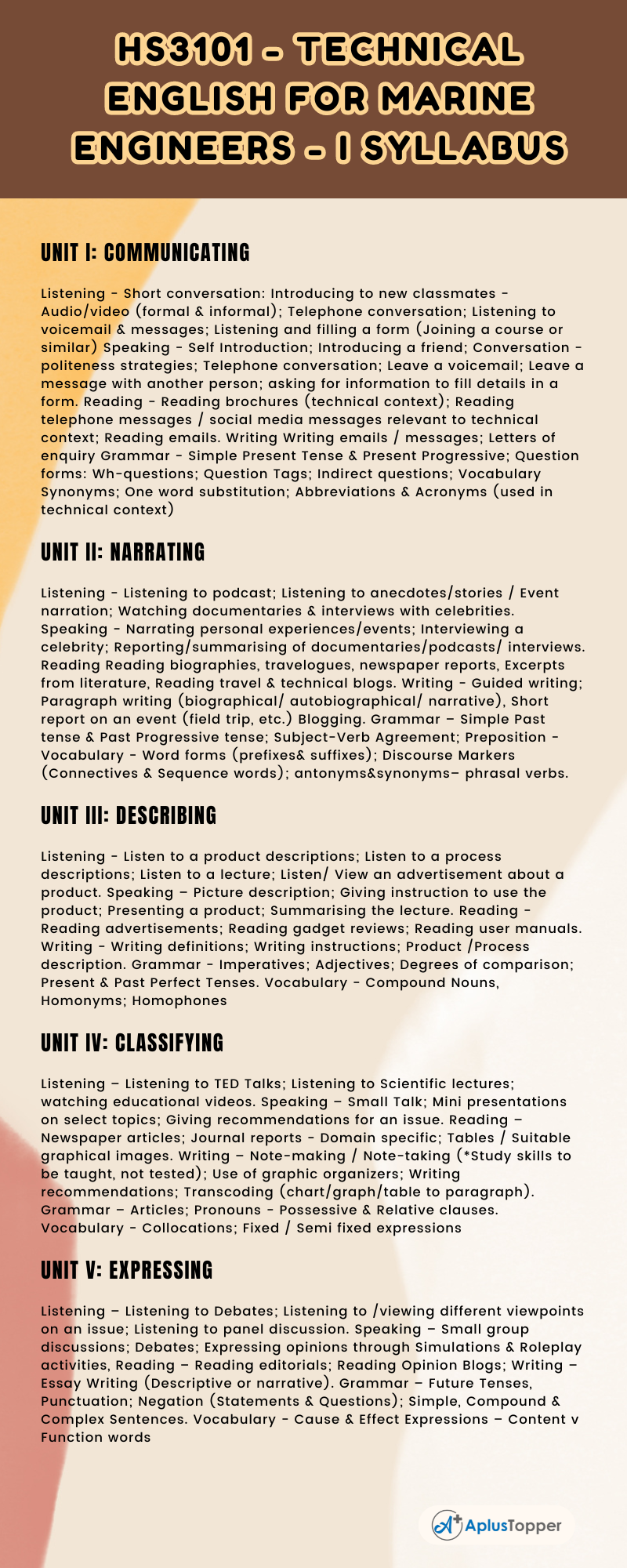Technical English for marine engineers is a dynamic subject that continuously shifts from one perspective to another. However, the technicality is the same even if the theories and perspectives vary. Hence to gain knowledge in this subject you must be equipped with more vicious on the syllabus.
In this article we tried to provide the required syllabus of the HS3101 Technical English For Marine Engineers – I subject to gain command of the subject matter. By the end of the course, you will be trained and guided with useful knowledge regarding technical english, which plays a major role in understanding the core of this B.E Marine Engineering semester I related to Affiliated institutions awarded by Anna University course. Hope this information is useful. Kindly share it with your friends. Comment below if you have queries regarding the syllabus.
If you want to know more about the syllabus of B.E. Marine Engineering connected to an affiliated institution’s four-year undergraduate degree program. We provide you with a detailed Year-wise, semester-wise, and Subject-wise syllabus in the following link B.E. Marine Engineering Syllabus Regulation 2021 Anna University.
Aim Of Concept:
- To improve the communicative competence of learners
- To help learners use language effectively in academic/technical contexts
- To build on students’ English language skills by engaging them in listening, speaking and grammar learning activities that are relevant to authentic contexts.
- To develop learners’ ability to read and write complex texts, summaries, articles, blogs, definitions, essays and user manuals.
- To use language effectively to express their opinions in various media.
HS3101 – Technical English for Marine Engineers – I Syllabus
Unit I: Communicating
Listening – Short conversation: Introducing to new classmates – Audio/video (formal & informal); Telephone conversation; Listening to voicemail & messages; Listening and filling a form (Joining a course or similar) Speaking – Self Introduction; Introducing a friend; Conversation – politeness strategies; Telephone conversation; Leave a voicemail; Leave a message with another person; asking for information to fill details in a form. Reading – Reading brochures (technical context); Reading telephone messages / social media messages relevant to technical context; Reading emails. Writing Writing emails / messages; Letters of enquiry Grammar – Simple Present Tense & Present Progressive; Question forms: Wh-questions; Question Tags; Indirect questions; Vocabulary Synonyms; One word substitution; Abbreviations & Acronyms (used in technical context)
Unit II: Narrating
Listening – Listening to podcast; Listening to anecdotes/stories / Event narration; Watching documentaries & interviews with celebrities. Speaking – Narrating personal experiences/events; Interviewing a celebrity; Reporting/summarising of documentaries/podcasts/ interviews. Reading Reading biographies, travelogues, newspaper reports, Excerpts from literature, Reading travel & technical blogs. Writing – Guided writing; Paragraph writing (biographical/ autobiographical/ narrative), Short report on an event (field trip, etc.) Blogging. Grammar – Simple Past tense & Past Progressive tense; Subject-Verb Agreement; Preposition – Vocabulary – Word forms (prefixes& suffixes); Discourse Markers (Connectives & Sequence words); antonyms&synonyms– phrasal verbs.
Unit III: Describing
Listening – Listen to a product descriptions; Listen to a process descriptions; Listen to a lecture; Listen/ View an advertisement about a product. Speaking – Picture description; Giving instruction to use the product; Presenting a product; Summarising the lecture. Reading – Reading advertisements; Reading gadget reviews; Reading user manuals. Writing – Writing definitions; Writing instructions; Product /Process description. Grammar – Imperatives; Adjectives; Degrees of comparison; Present & Past Perfect Tenses. Vocabulary – Compound Nouns, Homonyms; Homophones
Unit IV: Classifying
Listening – Listening to TED Talks; Listening to Scientific lectures; watching educational videos. Speaking – Small Talk; Mini presentations on select topics; Giving recommendations for an issue. Reading – Newspaper articles; Journal reports – Domain specific; Tables / Suitable graphical images. Writing – Note-making / Note-taking (*Study skills to be taught, not tested); Use of graphic organizers; Writing recommendations; Transcoding (chart/graph/table to paragraph). Grammar – Articles; Pronouns – Possessive & Relative clauses. Vocabulary – Collocations; Fixed / Semi fixed expressions

Unit V: Expressing
Listening – Listening to Debates; Listening to /viewing different viewpoints on an issue; Listening to panel discussion. Speaking – Small group discussions; Debates; Expressing opinions through Simulations & Roleplay activities, Reading – Reading editorials; Reading Opinion Blogs; Writing – Essay Writing (Descriptive or narrative). Grammar – Future Tenses, Punctuation; Negation (Statements & Questions); Simple, Compound & Complex Sentences. Vocabulary – Cause & Effect Expressions – Content v Function words
Text Books:
- English for Engineers & Technologists (2020 edition) Orient Blackswan Private Ltd. Department of English, Anna University.
- Learning to Communicate by Dr. V. Chellammal. Allied Publishers, New Delhi, 2003
References:
- Technical Communication – Principles And Practices By Meenakshi Raman & Sangeeta Sharma, Oxford Univ. Press, 2016, New Delhi.
- A Course Book On Technical English By Lakshminarayanan, Scitech Publications (India) Pvt. Ltd.
- English For Technical Communication (With CD) By Aysha Viswamohan, Mcgraw Hill Education, ISBN: 0070264244.
- Effective Communication Skill, Kulbhusan Kumar, RS Salaria, Khanna Publishing House
Related Posts On Semester – I:
- IP3151 – Induction Programme
- MA3101 – Mathematics for Marine Engineering – I
- PH3151 – Engineering Physics
- CY3101 – Chemistry for Marine Engineering
- GE3151 – Problem Solving and Python Programming
- GE3152 – தமிழர்மரபு /Heritage of Tamils
Must Read For More:
